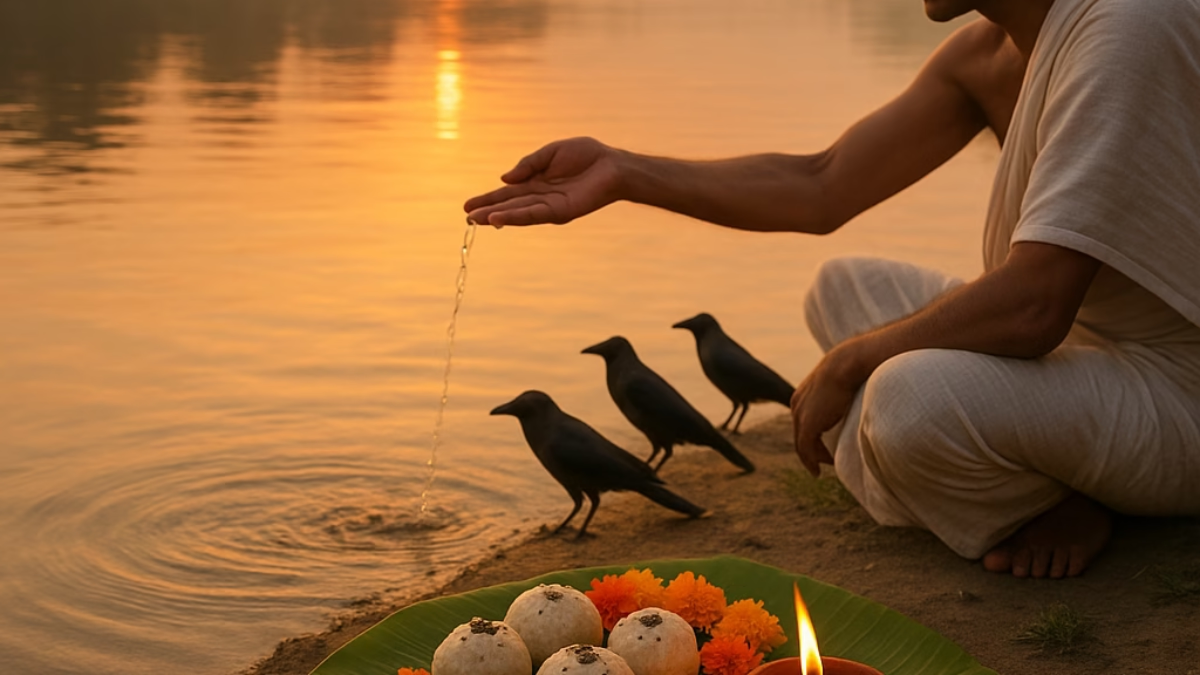A Fortnight of Ancestral Reverence
Pitra Paksh is a 16-day period in the Hindu calendar dedicated to honouring and remembering one’s ancestors. It is a time for paying homage to the forefathers, particularly through food offerings and rituals, to ensure their souls find peace and to receive their blessings. The period is also known as Pitru Paksha, Pitri Pokkho, Sorah Shraddha, and Mahalaya.
The observance of Pitra Paksh is rooted in a blend of mythology, science, and a deep-seated respect for one’s lineage.
The Mythology Behind Pitra Paksh
The most popular legend associated with Pitra Paksh comes from the epic Mahabharata. It tells the story of Karna, a great warrior known for his charitable nature. After his death, Karna’s soul ascended to heaven, where he was offered food made of gold and jewels. Confused, Karna asked the reason for this strange offering. The lord of heaven, Indra, explained that while Karna had generously donated gold and gems throughout his life, he had never offered food to his ancestors. Acknowledging his mistake, Karna was granted a 16-day period to return to Earth to perform the necessary rituals and offer food to his forefathers. This period is said to have become the fortnight of Pitra Paksh.
The Scientific and Psychological Perspective
Beyond the mythological narratives, there are compelling psychological and social reasons behind the rituals of Pitra Paksh. From a psychological standpoint, the rituals provide a structured way for individuals and families to process grief and loss. Performing the ceremonies can bring a sense of closure and emotional healing. The act of coming together as a family to remember and honor shared ancestors strengthens familial bonds and reinforces a sense of continuity and belonging.
From a societal perspective, the rituals promote gratitude and a sense of duty towards one’s lineage. They remind people that their lives are built on the sacrifices and efforts of previous generations. This fosters a deep-rooted respect for elders and heritage. The practice of feeding the poor, crows, and other animals during this period also serves as an act of charity, promoting compassion and a sense of social responsibility. Some interpretations even link the timing of Pitra Paksh to the seasonal changes, suggesting that the traditional foods offered, like kheer (rice pudding), were intended to help the body’s digestive system adapt to the changing climate.
The Rituals and Their Significance
The rituals performed during Pitra Paksh are collectively known as Shraddha, a word derived from “Shraddha” meaning faith. These rituals are typically performed by the male descendants of the family, though in the absence of a male heir, daughters or wives can also perform them.
The key rituals include:
- Pind Daan: The offering of pindas, which are balls made of cooked rice mixed with black sesame seeds, ghee, and honey. These are symbolic offerings meant to nourish the souls of the ancestors.
- Tarpan: The offering of water mixed with black sesame seeds and barley. This act is performed to quench the spiritual thirst of the departed souls.
- Feeding the Living: A significant part of the ritual involves feeding Brahmins, the poor, and animals, especially crows. Crows are believed to be messengers of Yama, the god of death, and their acceptance of the food is considered a sign that the ancestors have received the offerings.
- Donations and Charity: Acts of charity, such as donating clothes, food, and money to the needy, are also considered highly meritorious and are believed to bring blessings from the ancestors.
Why Performing the Rituals is Beneficial
For Hindus, performing these rituals is considered a sacred duty (pitru rin or ancestral debt). It is believed that by fulfilling this duty, one helps their ancestors achieve liberation and peace (moksha). In return, the ancestors are believed to bless their descendants with prosperity, good health, and harmony, and to mitigate any karmic imbalances or obstacles (Pitru Dosha) in the family lineage. The rituals thus serve as a spiritual bridge between the living and the dead, ensuring that the legacy of love and blessings continues across generations.
From an astrological perspective, Pitra Paksh is considered a profoundly significant and powerful period. It is believed that during this fortnight, the boundaries between the physical world and the realm of ancestors (Pitru Loka) become more porous. This allows for a stronger connection between the living and the departed souls, making the rituals performed during this time exceptionally effective.
The primary astrological purpose of Pitra Paksh is to address and alleviate a condition known as Pitra Dosha. In Vedic astrology, Pitra Dosha is not a curse but rather a karmic debt or imbalance inherited from one’s ancestors. It is believed to manifest in a person’s birth chart (kundli) through specific planetary placements, such as the conjunction or affliction of the Sun, Rahu, Ketu, or Saturn, particularly in the 9th house (the house of ancestors, father, and dharma) and the 5th house (the house of past karma and children).
The presence of Pitra Dosha is believed to cause various challenges in a person’s life, including:
- Financial difficulties and career setbacks
- Issues in marriage and relationships
- Problems with childbirth or progeny
- Recurring health issues or chronic illnesses
- General feelings of anxiety, struggle, and a lack of peace
The rituals of Pitra Paksh, such as Pind Daan (offering rice balls) and Tarpan (offering water), are considered the most potent remedies for mitigating the effects of Pitra Dosha. Astrologers believe that by performing these rituals with sincerity and devotion, one can pacify the restless souls of their ancestors, help them attain peace and liberation, and in return, receive their blessings. The act of charity and feeding the needy during this period is also considered a powerful way to generate positive karma and address these ancestral debts.
#PitraPaksh #HinduRituals #AncestralWorship #IndianCulture #Mahabharata #Karna #PitraDosha #Shraddha #SpiritualJourney #Hinduism


Add a Comment